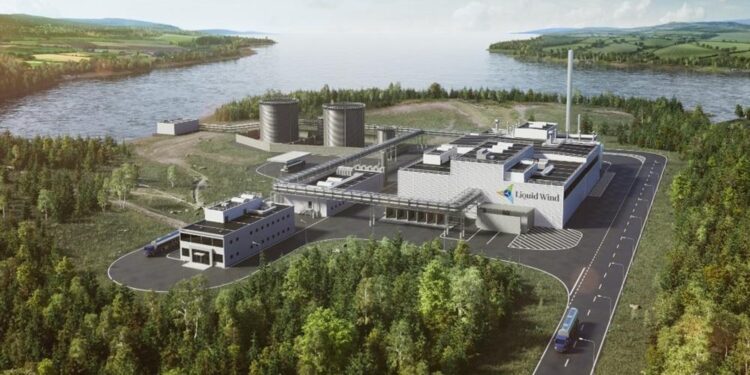Denmark’s E-Methanol Facility: A Groundbreaking Step in Sustainable Energy
In a significant advancement for the renewable energy sector, Denmark has launched the world’s first commercial-scale e-methanol production plant, marking a crucial milestone in the journey toward carbon neutrality. This cutting-edge facility utilizes renewable electricity to convert carbon dioxide and water into e-methanol, providing an eco-friendly option to conventional fossil fuels. As countries around the globe ramp up their initiatives to address climate change and seek viable energy solutions, this plant is poised to transform both maritime and transportation industries while dramatically reducing greenhouse gas emissions.
The facility is designed to generate significant amounts of e-methanol, catering to various sectors including shipping and heavy-duty transport. The primary benefits of this innovative establishment include:
- Reduction in CO2 Emissions: Contributing towards meeting climate targets.
- Sustainable Production Techniques: Utilizing renewable energy sources for fuel creation.
- Infrastructure Compatibility: E-methanol can easily integrate with existing systems.
The inauguration event drew attention from key industry figures and government officials, emphasizing the urgent need for sustainable solutions amid growing environmental challenges. Stakeholders are hopeful about fostering collaborations across industries that will explore the extensive potential of e-methanol. With plans for annual production reaching thousands of tons, future expansions may be considered as demand for clean fuel alternatives rises. Strengthened partnerships among energy providers, automotive manufacturers, and shipping companies could expedite global shifts toward sustainable energy frameworks.
E-Methanol’s Impact on Industrial Decarbonization
This pioneering initiative positions Denmark as a leader in sustainable industrial practices through its groundbreaking e-methanol facility. By converting carbon emissions into usable fuel via advanced technology‚ÄĒspecifically capturing CO2 and combining it with hydrogen derived from water electrolysis‚ÄĒthe plant not only reduces greenhouse gas emissions but also offers a practical substitute for traditional fossil fuels across various sectors.
The broader implications of this development underscore e-methanol’s potential role in global decarbonization efforts. Key advantages include:
- Significant Emission Reductions: E-methanol can greatly lower carbon footprints within transportation networks.
- Circular Economy Integration: Utilizing captured CO2 promotes sustainability within industrial operations.
- Efficacious Energy Storage Solutions: E-methanol acts as an effective medium for storing renewable energy resources.
| Main Feature | Pivotal Impact |
|---|---|
| Sustainability Commitment | Aids in achieving international climate goals |
Strategic Pathways Toward Global Adoption of E-Methanol
The successful launch of Denmark’s first commercial-scale e-methanol facility marks a vital turning point in transitioning towards environmentally friendly fuels. To effectively scale production and encourage widespread adoption worldwide, strategic measures must be implemented.
Collaboration among industries,governmental entities,and research institutions will be essential in establishing a robust framework for growth. Key focus areas should encompass:
- Promoting investments in renewable resources that power e – methanolfuel production processes .
- Standardizing regulations across sectors , minimizing barriers to market entry .
- Developing infrastructure for efficient distribution , integrating with current fuel systems .
- Raising public awareness about environmental benefits , driving consumer acceptance .
Additionally,research innovation must take precedence , enhancing production efficiency while reducing costs.Establishing international partnerships can facilitate knowledge sharing along with technological advancements. Investment into pilot projects across diverse regions will yield valuable insights regarding scaling challenges alongside local adaptation requirements.
Future initiatives should prioritize these critical elements :
| Main Element | Necessary Action Required |
|---|---|
| Technological Advancement | Encourage R&D focused on catalysis electrolysis. |
| Create financing models supporting production facilities. „ÄÄ„ÄÄ |
Final Reflections on Denmark’s Innovative Approach
In conclusion,the establishment of the world‚Äôs first commercial-scale e-methanol plant signifies an crucial achievement in advancing toward sustainable energy sources globally. This state-of-the-art facility not only highlights Denmark’s commitment to carbon-neutral strategies but also serves as an inspiring model for future investments aimed at green technologies worldwide.
By efficiently converting renewable resources into methanol,the plant aims not onlyto reduce dependence on fossil fuels but also contribute significantlytowards decarbonizing various industries such as shippingand transportation.As nations increasingly emphasize environmental sustainability,Danish innovations may motivate similar initiatives globally,paving pathways toward cleaner futures.As observers keep a close watch,the successof this venture could herald new possibilitiesinrenewableenergy‚ÄĒdemonstratingthat ambitiousclimategoalscanbeachievedthroughboldinnovationandcollaborativeefforts.
















